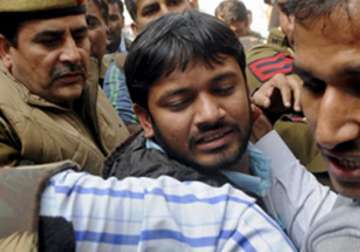JNU row: Kanhaiya Kumar gets bail in sedition case, to walk out of Tihar jail today
New Delhi: A day after the Delhi High Court granted him an interim bail of six months, JNUSU president Kanhaiya Kumar will walk out of the Tihar Jail today. The court granted the interim bail

New Delhi: A day after the Delhi High Court granted him an interim bail of six months, JNUSU president Kanhaiya Kumar will walk out of the Tihar Jail today. The court granted the interim bail to Kanhaiya on a bond of Rs 10,000 and asked the JNU faculty to stand surety for the same amount for his release.
The HC also asked the JNU faculty to ensure that there are no anti-India slogans raised by Kanhaiya. He will also have to coopoerate with the police in its probe in the case. Further, the court also asked the accused to furnish an undertaking that he will not violate any of the conditions mentioned in the bail order.
The HC, while granting the conditional interim bail, asked Kanhaiya's lawyers to file the surety and bail bond before the Metropolitan Magistrate court.
Also Read: 13 major highlights of Delhi HC order on Kanhaiya's bail
The High Court took strong exception to the manner in which slogans were raised and protest staged by the students carrying photographs and posters of Parliament attack case convict Afzal Guru and Maqbool Bhat, mastermind of hijacking of a passenger airline to Lahore in 1971 who was hanged in 1984, on the campus.
"The feelings or the protest reflected in the slogans need introspection by the student community whose photographs are available on record holding posters, carrying photographs, of Afzal Guru and Maqbool Bhat," the judge said.
The High Court noted that Kanhaiya belongs to an intellectual class pursuing PhD from International School of Studies, JNU, which is considered as hub of intellectuals.
"Freedom of speech guaranteed to the citizens of this country under the Constitution of India has enough room for every citizen to follow his own ideology or political affiliation within the framework of our Constitution," the judge said.
"He may have any political affiliation or ideology. He has every right to pursue that but it can only be within the framework of our Constitution. India is a living example of unity in diversity. Freedom of expression enjoyed by every citizen can be subjected to reasonable restrictions under Article 19(2) of our Constitution," the judge added.
"The reason behind anti-national views in the mind of students who raised slogans on death anniversary of Afzal Guru, who was convicted for attack on our Parliament, which led to this situation have not only to be found by them but remedial steps are also required to be taken in this regard by those managing the affiars of the JNU so that there is no recurrence of such incident," he added.
"While dealing with the bail application of the petitioner, it has to be kept in mind by all concerned that they are enjoying this freedom only because our borders are guarded by our armed and paramilitary forces. Our forces are protecting our frontiers in the most difficult terrain in the world i.e. Siachen or Rann of Kutch."
"The kind of slogans raised (at the JNU) may have demoralising effect on the family of those martyrs who returned home in coffin draped in tricolour."
The HC, during an earlier hearing in the case on February 29, had reserved its verdict on the bail plea of the JNU leader over the event held at the JNU campus on February 9. Kanhaiya, who has been in judicial custody since February 16, had submitted through senior advocate Kapil Sibal, that anti-India slogans inside the campus were raised by people with covered faces and not him.
Kanhaiya, who was arrested on February 12 from the JNU campus, had sought bail claiming that he had not raised any anti-India slogans but the Delhi Police had maintained before the HC that they have evidence to show that the accused had raised anti-national slogans.
The role of the Delhi Police has also come under scanner in this entire incident. Contrary to its earlier claims that the police had sufficient evidence to prove that Kanhaiya had indeed raised anti-India slogans, nothing substantial was presented as evidence before court. The lack of video evidence to prosecute Kanhaiya on part of the police also drew the ire of the the High Court.
"Everything was happening at JNU, SHO was stationed at Gate, there were plain clothes police there? If you have all these people then why wait for Zee News video?" the court said referring to a video that allegedly turned out to be doctored.
The court further asked police why the FIR was not registered on that day itself if Kanhaiya and others had raised anti-India slogans as police personnel were present in plain clothes during the event and had witnessed the incident.
"Someone was raising such slogans (anti-India) which you can't even read here in court. Police was present there, why was police there relaxing? Is it possible? Wasn't police supposed to take cognisance then and there? Why wait for TV recording?” HC slammed Delhi Police
Through the proceedings in the Delhi High Court, Kanhaiya also sought to distance himself with other accused in the case, saying that the application for organising the event in question was filed by Umar Khalid and Anirban Bhattacharya. Both accused in the case are presently undergoing custodial interrogation.
"Obviously, Kanhaiya had no part to play as he had not applied for the event. There itself the case against Kanhaiya goes," the counsel said.
Sibal, who was assisted by another senior advocate Rebeca John, submitted that the court can itself find from the video that Kanhaiya himself was seen asking people with muffled face, also accused of raising anti-India slogans, for their identity cards.
(With PTI inputs)